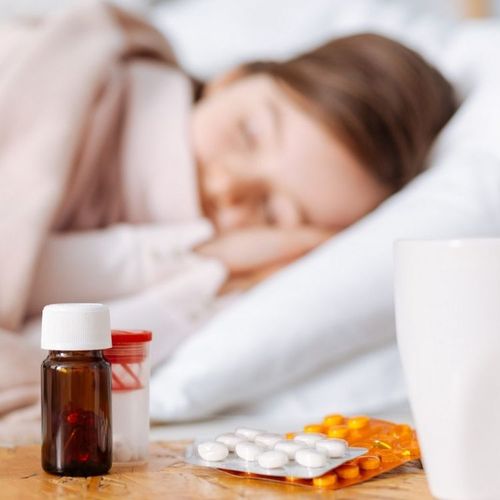More Americans than ever are taking sleeping pills. Last year, about 42 million prescriptions for sleep medication were filled.
Insomnia is more than an annoyance. It can wreak havoc on the immune system, contributing to serious illnesses.
Newer sleep medications, such as zolpidem (Ambien), zaleplon (Sonata), ramelteon (Rozerem) and eszopiclone (Lunesta), are believed to be safe.
However: Even these medications can cause headaches, daytime drowsiness, dizziness and other adverse effects. Older adults, who are most likely to use sleeping pills, are particularly sensitive to them.
Is there a better option? Absolutely. New studies have found that natural treatments are just as effective as sleep medication for mild to moderate insomnia.
GETTING STARTED
Most people require eight hours of sleep a night to feel refreshed and stay healthy, but some of us need as many as 10 hours and others as little as four.
If you have trouble falling asleep, staying asleep or you regularly awaken earlier than you'd like, schedule an appointment with your primary care physician. Medical problems, such as thyroid disorders, pain and allergies, can compromise sleep. Treating such conditions can improve sleep.
Depression, anxiety, a panic disorder or even everyday stress also can disturb sleep. If you suspect that psychological issues may be causing sleeplessness, mention it to your doctor and consider consulting a mental health professional.
If your doctor can't find a medical problem, you can begin a natural self-help treatment plan. To determine whether natural approaches will be effective, you must try them for at least one or two weeks—one at a time.
Helpful: Keep a log of your sleep quality for at least a week, preferably two. Use a rating scale from one to 10, with 10 being optimal. Rate your sleep each night—preferably about a half hour after you get out of bed in the morning.
When you introduce one of the strategies described below, rate your nightly sleep again for about a week or two. If the ratings improve, you know that the technique you're trying works for you.
BEHAVIORAL APPROACHES
During my 40-year career, I've treated thousands of adults with sleep complaints. Here are the simple strategies that I've found to be most successful...
- Create a sleep-inducing environment. Keep your bedroom at a temperature that is comfortable for you (cooler is typically better)...turn out all the lights (darkness promotes the body's production of the sleep-promoting hormone melatonin)—some people, however, sleep better with a night-light...and, if necessary adjust your sound level—some people like total quiet, while others prefer soft background noise, such as a radio or a "white noise" machine.
- Go to bed at about the same time each night so that your body gets into a rhythm. Some insomniacs are kept awake all night worrying what time it is, so putting a clock where you cannot see or reach it is often helpful. It is counterproductive to lie in bed desperately trying to fall asleep. Distract your mind by reading.
- Get more physical activity. Physically fit people tend to sleep more deeply. If you have been sedentary, start performing aerobic exercise, such as brisk walking or bicycling, three times a week.
Some sleep research indicates that it's best to exercise four to six hours before going to bed.
If you exercise too close to bedtime, your body may be too stimulated for you to fall asleep.
- Meditate. Studies show that a period of meditation during the day or the early evening helps fight insomnia by promoting physical relaxation and/or slowing the mind.
SUPPLEMENTS
If the behavioral approaches described above don't work as well as desired, consider also trying a sleep-promoting supplement (available at health-food stores).*
Effective supplements...
- Melatonin has been shown to help restore a more normal sleep cycle—but it rarely lengthens the amount of time you sleep. If you have problems falling asleep, take it two hours before bedtime. If you wake up too early or in the middle of the night, take it when you awaken.
Recommended dose: Start with 3 mg once a day. If this does not work, gradually increase the dosage over a period of a month to a maximum of 9 mg daily.
Possible side effects: Headache, digestive upset and depression. Long-term use of melatonin has not been studied, so consult your doctor if you need to use this hormone for more than a few months or you develop side effects.
- Valerian is an herb that has been rigorously tested. It helps many people fall asleep faster and stay asleep longer.
Recommended dose: Take one-half to one teaspoon of liquid extract or 300 mg to 500 mg in powdered form or capsules about 20 minutes before bedtime.
Possible side effect: Stomach upset.
- 5-hydroxytryptophan (5-HTP) is a compound derived from the seed of the Africanplant griffonia. 5-HTP is best known as a treatment for mild to moderate depression. The scientific evidence on 5-HTP's efficacy as a sleep aid is inconclusive at this time, but the compound may be worth trying if you don't get relief from the other supplements listed above. 5-HTp has helped some of my patients.
Recommended dose: Ask your doctor.
*The FDA does not regulate herbal and other natural supplements. Do not take these supplements if you are pregnant or nursing.
Possible side effect: Mild nausea.
- Vitamin B-12 and/or calcium can improve your sleep if you have a deficiency of either one. Both vitamin B-12 and calcium calm the nervous system and have a mild sedative effect in some people.
Recommended dose: Ask your doctor.
Possible side effects: None are known.
Important: If you are taking any medications, including prescription sleeping pills, consult your doctor before taking these supplements.
